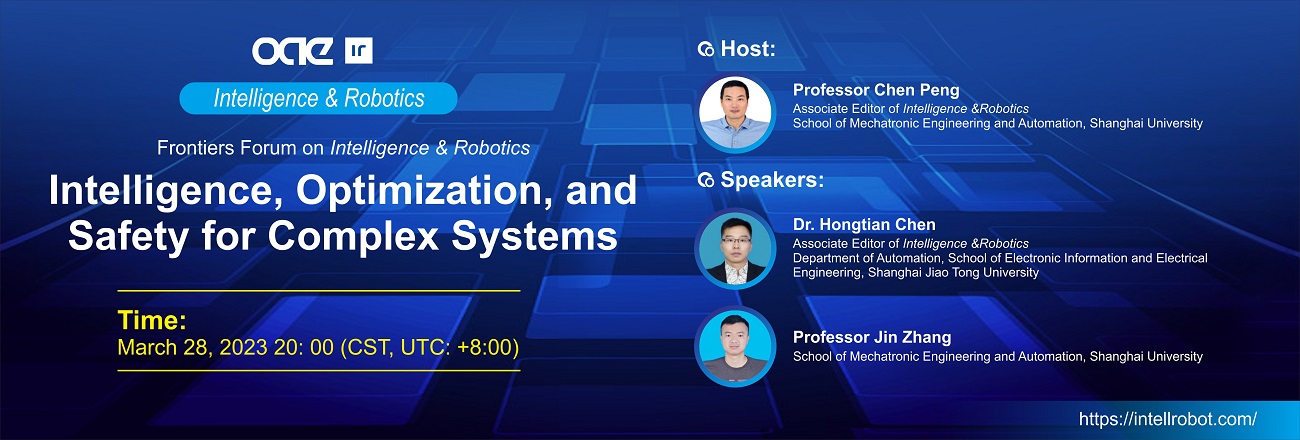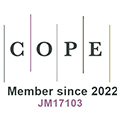Contents
Host

Professor Chen Peng
Associate Editor of Intelligence & Robotics
School of Mechatronic Engineering and Automation, Shanghai University, China
Special Issue: Intelligence, Optimization, and Safety for Complex Systems is calling for papers!
School of Mechatronic Engineering and Automation, Shanghai University, China
Special Issue: Intelligence, Optimization, and Safety for Complex Systems is calling for papers!
Chen Peng, Deputy Dean, Professor, Doctoral Supervisor, School of Mechanical and Electrical Engineering and Automation, Shanghai University. He received the B.Sc. and M.Sc. degrees in coal preparation and the Ph.D. degree in control theory and control engineering from the Chinese University of Mining Technology, Xuzhou, China. His current research interests include networked control systems, distributed control systems, smart grids, and intelligent control systems. He is an Associate Editor of a number of international journals, including the IEEE Transactions on Industrial Informatics, Information Sciences, and Transactions of the Institute of Measurement and Control. He was named a Highly Cited Researcher in 2020 and 2021 by Clarivate Analytics.
Speaker(s)
Dr. Hongtian Chen
Associate Editor of Intelligence & Robotics
Department of Automation, School of Electronic
Information and Electrical Engineering, Shanghai Jiao Tong University, China
Topic: Explainable Fault Diagnosis: A Bridge Between Unsupervised and Supervised Learning-based Fault Diagnosis Approaches
Department of Automation, School of Electronic
Information and Electrical Engineering, Shanghai Jiao Tong University, China
Topic: Explainable Fault Diagnosis: A Bridge Between Unsupervised and Supervised Learning-based Fault Diagnosis Approaches
The increased complexity and intelligence of automation systems require the development of intelligent fault diagnosis (IFD) methodologies. By relying on the concept of a suspected space, this study develops explainable data-driven IFD approaches for nonlinear dynamic systems. More in detail, we parameterize nonlinear systems through a generalized kernel representation used for system modeling and the associated fault diagnosis. An important result obtained is a unified form of kernel representations, applicable to both unsupervised and supervised learning. More importantly, through a rigorous theoretical analysis we discover the existence of a bridge (i.e., a bijective mapping) between some supervised and unsupervised learning-based entities. Notably, the designed IFD approaches achieve the same performance by the use of this bridge. In order to have a better understanding of the results obtained, unsupervised and supervised neural networks are chosen as the learning tools to identify generalized kernel representations and design the IFD schemes; an invertible neural network is then employed to build the bridge between them. This report is a perspective talk, whose contribution lies in proposing and detailing the fundamental concepts for explainable intelligent learning methods, contributing to system modeling and data-driven IFD designs for nonlinear dynamic systems.
Dr. Jin Zhang
School of Mechatronic Engineering and Automation, Shanghai University, China
Topic: Vibrational control with square wave dithers: A time-delay approach
Topic: Vibrational control with square wave dithers: A time-delay approach
This talk is concerned with stabilization problem of second-order systems by fast-varying square wave dithers depending on a small parameter. We first employ the known in vibrational control coordinate transformation that allows to cancel the high-gain term due to the introduced controller, and then present a time-delay approach to periodic averaging of the system in new coordinates. The resulting time-delay system is a perturbation of the averaged system in new coordinates which is assumed to be exponentially stable. The stability of the time-delay system guarantees the stability of the original system. We construct an appropriate Lyapunov functional for finding sufficient stability conditions in the form of linear matrix inequalities (LMIs). The upper bound on the small parameter that preserves the exponential stability is found from LMIs. Finally, two numerical examples including vibrational control of suspended pendulum illustrate the efficiency of the method.
Programme
Programme
Time(UTC: +8:00)
Speakers
Topics
20:00-20:10
Chen Peng
Welcome remarks
20:10-20:40
Hongtian Chen
Explainable Fault Diagnosis: A Bridge Between Unsupervised and Supervised Learning-based Fault Diagnosis Approaches
20:40-21:10
Jin Zhang
Vibrational control with square wave dithers: A time-delay approach
21:10-21:30
All
Q & A Session






